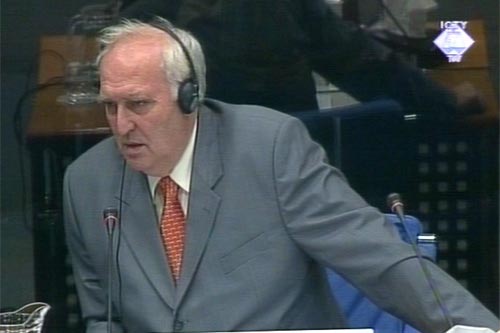Home
TWO VERSIONS OF MEETING WITH MILOSEVIC
Prosecutor challenges Farkas's version of the meeting of top military and police personnel with President Milosevic on 17 May 1999. Farkas's story, presented in his examination-in-chief yesterday is contradicted by the version presented by Aleksandar Vasiljevic in the course of the prosecution case
 Geza Farkas, defense witness for Milosevic
Geza Farkas, defense witness for Milosevic Some of Milosevic's defense witnesses have claimed that the Kosovo Albanians exhumed the bodies of more than 800 victims, transferred them in secret to Serbia and buried them in mass graves at the Interior Ministry training area in Batajnica. Prosecutor Geoffrey Nice labeled such claims "nonsensical", "absurd" and "physically unfeasible". General Geza Farkas, also testifying as Slobodan Milosevic's defense witness, agreed with him in his cross-examination.
General Farkas, head of the military security service during the Kosovo conflict, avoided giving a direct answer to the question the prosecutor asked several times: could the Serbian Interior Ministry have organized the operation to exhume, transport and rebury the bodies of the Kosovo victims without the knowledge and approval of the Yugoslav Army. The general replied to each of those questions that the military had had no involvement of knowledge of the operation, and that the military had controlled the state border, but not the border between Serbia and the province; the bodies were moved across the later.
Prosecutor challenged Farkas's version of the meeting of top military and police personnel with President Milosevic on 17 May 1999. Farkas's story, presented in his examination-in-chief yesterday was contradicted today by the version presented by Aleksandar Vasiljevic in the course of the prosecution case. According to Farkas, the topic of the discussion at the meeting was the crimes committed in Kosovo by the former Arkan's men and Scorpions that were part of the Interior Ministry units. Milosevic angrily "demanded explanations", ordering that the issue "be resolved immediately and that all the perpetrators be brought to justice as soon as possible".
According to Vasiljevic, who attended the meeting as Farkas's deputy, keeping notes of what was said, General Nebojsa Pavkovic complained that the Interior Ministry was accusing the VJ of the death of about 800 people. Pavkovic noted that according to investigations carried out by the security service, the military was responsible for the deaths of "only" 271 persons. On the other hand, Rade Markovic presented the records kept by the Interior Ministry; the police forces accepted responsibility for the deaths of 326 persons.
As Vasiljevic testified, General Pavkovic suggested at the meeting that a state commission be established to investigate the crimes of the military and the police. His idea was supported by Nikola Sainovic, deputy prime minister in the federal government. The indictment alleges he was Milosevic's head man for Kosovo. According to Vasiljevic, Milosevic didn't say anything and didn’t issue any instructions about the issue.
After the prosecutor confronted Farkas with Vasiljevic's version of the meeting, Farkas confirmed that Pavkovic and Markovic had presented such figures for the victims of the military and the police and that the proposal had been made to establish a state commission. He denied, however, that Milosevic had not said or ordered anything. Farkas claims Milosevic ordered that "first the thing with the volunteers be resolved, and then the military and police should sit down and agree what to do and how".
Noting that the military and police presented figures of between 500 and 800 victims at the meeting with Milosevic on 17 May 1999, the prosecutor asked Farkas how many of those crimes had been solved and how many perpetrators had been punished. Farkas was unable to answer, saying that soon after the meeting the military and the police withdrew from Kosovo. The investigations that had been launched could not be completed.
The prosecutor then noted that according to the documents shown by General Radomir Gojovic, former head of the Legal Directorate in the VJ General Staff during his testimony, the military judicial system prosecuted only three of the cases involving crimes in Kosovo. A total of 7 persons were indicted and subsequently convicted. General Farkas, however, claims he "did not deal with that" because at the time they were "withdrawing forces and faced a lot of problems". He therefore doesn't know "what the civilian courts were doing".
Linked Reports
- Case : Milosevic Slobodan - "Kosovo, Croatia and Bosnia"
- 2005-11-09 VIEW FROM THE TOP OF THE "MILITARY SECURITY PYRAMID"
- 2005-11-02 COLONEL AND "DISGUSTING BOOK"
- 2005-11-01 TROUBLE WITH "CLEANSING"
- 2005-11-11 MILOSEVIC ILL
- 2005-11-15 UNSUBSTANTIATED CLAIMS
- 2005-11-15 MILOSEVIC ASKS FOR SIX WEEKS OF "PHYSICAL AND MENTAL BREAK"
